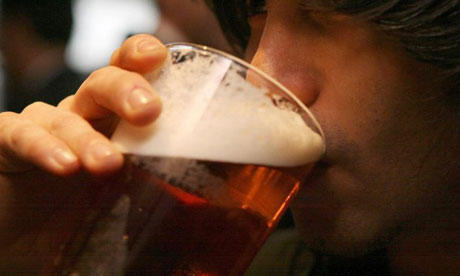
"Drinking in particular was a universal practice in which occupation they (the English) passed entire nights as well as days … They were accustomed to eat until they became surfeited and to drink till they were sick."
Sounds like an average night in Brighton or Nottingham or Glasgow, but that's what William of Malmesbury wrote in about AD1100.
Well, not much has changed in a thousand years, then. But Sir Liam Donaldson, the Chief Medical Officer thinks it's high time we did, and that we should pay 50p per unit of alcohol on top of all the tax and other charges, and who can say he's wrong and that he won't get his way. After all, he called for a ban on smoking in public places, was pooh-poohed by the politicos at the time, and lo and behold we now have a ban on smoking in public places.
There has been a growing campaign to alert us to the dangers of drink over the last few years. Remember all the concerted finger-wagging over unseemly behaviour in public, damage to young livers, middle-aged livers, old livers, middle-class alcoholics secretly soaking the stuff up in the privacy of their own homes, and so on.
The medical profession has been very precise about the cost of excess drinking to the public purse and about the domestic damage it causes. It has been silent, however, on the contribution drink makes to survival in this turbulent world, on how the odd tincture or two helps you through the working day, helps you cope with stress on the home front, makes tolerable the intolerable. In short, the contribution alcohol makes to human happiness. That's the trouble with happiness. It's rather difficult to quantify, and it doesn't show up on DoH statistics.
Before anyone gets all huffy with me, of course I am not endorsing excess, drunkenness, alcohol fuelled violence and all the rest. That is vile and unacceptable. Neither am I ignoring the potential health benefits of advice backed by genuine scientific studies. I am just not convinced that the endless stick treatment favoured by the medical profession and good many politicians is going to work.
You have to ask yourself, if a form of behaviour has been endemic for at least 900 years, why? And simply to say that's it's a bad thing and we must be punished for it is not good enough. Indeed. Sir Liam's strictures bear an uncanny resemblance to the "Warn them of the terrible judgement of God lest for their bodily desires they incur the pains of eternal punishment" that Pope Gregory I thundered 500 years before William of Malmesbury made his observations.
More curiously, it points to serious inconsistencies in institutional thinking. As we are constantly being told, heart disease is the biggest killer and diet related diseases the biggest drain of NHS resources. In other words, the national obsession with eating until we become surfeited is more damaging to society and the exchequer than drink is, but I think we have yet to hear the call for a levy of, say, 50p per unit of fat or fines for excess salt or sugar in manufactured foods.
Perhaps it's only a matter of time. We live an age of age of new puritanism. Everyone is so busy telling everyone else what they can't do. We seem to be busy drawing up a new set of 10 commandments - Thou shall not smoke. Thou shall not drink. Thou shall not hunt. Thou shall not make too much noise. Thou shall not enjoy yourself. If you do, you will be consigned to the everlasting hellfire of social damnation.
Is this an approach which will result in real benefits to people's health in the modern world?

